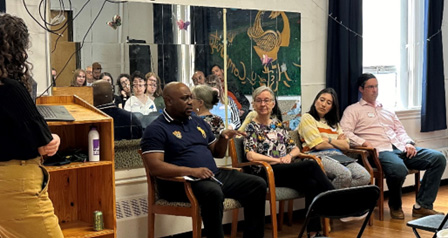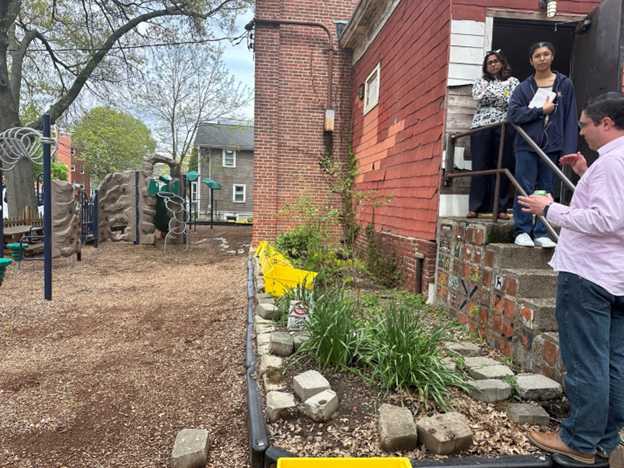Climate Change and Social Resilience
Written by Sasha Shyduroff-Gutman, Principal Planner
Pictured: A block party in Cambridge, MA. Photo credit: City of Cambridge
May 29, 2024 - In early May, municipal staff from across the Metro Mayors region convened at the Cambridge Community Center to learn more about the intersections between public health, climate, and social resilience at the community level. Municipalities planning for the impacts of climate change have a growing interest in social resilience – how well communities and people can cope with and recover from climate disruptions. Personal and community level social resilience depend on many factors, including the capacity to adapt, the extent and strength of existing social connections, and access to resources.

Since 2021, the City of Cambridge has been a leader in focusing on social resilience as part of the “Closer Neighborhoods” strategy outlined in their Resilient Cambridge Plan, which recognizes that “success will depend on the strength and resilience of our social networks: family, friends, and neighbors; work, school, and religious, cultural, and community organizations; and City services and resources.” [1] The City has worked across multiple departments to strengthen social resilience, including partnering with community-based organizations (CBOs). The following are some examples of the great work happening in Cambridge.
Cambridge Community Center (CCC) - A Resilience Hub for the Community
The CCC is a nonprofit located near Central Square that has been a community institution for nearly 100 years. The CCC provides a wide range of programs and services for youth, families, and seniors living in Cambridge. During the COVID-19 pandemic, CCC quickly launched and scaled up its food pantry to serve more than 1,000 families weekly. In many ways, CCC is already a resilience hub for the community, providing key programming and services, as well as building social connectedness and community. CCC is also in the process of renovating their building to include solar plus energy storage so that they can continue to operate in emergencies, including when the electrical grid goes down. To learn more about their efforts as a resilience hub, see here.

Cambridge Community Corps (C3) - A Community Health Ambassadors Program
In 2020, the Cambridge Public Health Department launched the Cambridge Community Corps (C3) as a grassroots network of paid community-health ambassadors coordinated by the City. The C3 was initially created to support outreach during the COVID-19 pandemic, including educating residents and getting people access to things like masks, test kits, and vaccines. Since the pandemic, the C3 has evolved to serve a variety of public health issues and climate impacts such as extreme heat, increases in vector-borne diseases, and flooding. Between 2022-2024, MAPC partnered with Cambridge’s Public Health Department to co-develop a series of training workshops for C3 members and build out resources for these types of community ambassadors / liaison type programs. For more information on training and resources see here.
Block Parties - Building Resilience One Party at a Time
While Cambridge has had a long history and culture of block parties, where neighbors come together to connect informally often around food and games, in 2023 the City of Cambridge made it easier for neighborhoods to host them. The Cambridge Public Health Department, Community Development Department’s Arts and Cultural Planning and Play Streets programs, Transportation Department, and Cambridge Arts came together with support from the City Council to increase block parties to build social connectedness at the neighborhood scale. Together, they eliminated the block party fee, reduced the signature requirement, and shortened the approval process. In addition to reducing these permitting barriers, they also offer $300 cash awards and Play Streets kits for residents to use. For more information on block parties see here.
Useful Resources:
- Urban Sustainability Directors Network (USDN) on Resilience Hubs
- MAPC Resources on Community Liaison Programs and Climate Curriculums
[1] Resilient Cambridge Summary Report page 10 Resilient Cambridge Summary Report - Cambridge Massachusetts
